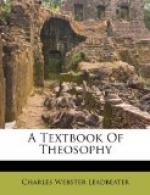For this is a school in which no pupil ever fails; every one must go on to the end. He has no choice as to that; but the length of time which he will take in qualifying himself for the higher examinations is left entirely to his own discretion. The wise pupil, seeing that school-life is not a thing in itself, but only a preparation for a more glorious and far wider life, endeavours to comprehend as fully as possible the rules of his school, and shapes his life in accordance with them as closely as he can, so that no time may be lost in the learning of whatever lessons are necessary. He co-operates intelligently with the Teachers, and sets himself to do the maximum of work which is possible for him, in order that as soon as he can he may come of age and enter into his kingdom as a glorified ego.
Theosophy explains to us the laws under which this school-life must be lived, and in that way gives a great advantage to its students. The first great law is that of evolution. Every man has to become a perfect man, to unfold to the fullest degree the divine possibilities which lie latent within him, for that unfoldment is the object of the entire scheme so far as he is concerned. This law of evolution steadily presses him onward to higher and higher achievements. The wise man tries to anticipate its demands—to run ahead of the necessary curriculum, for in that way he not only avoids all collision with it, but he obtains the maximum of assistance from its action. The man who lags behind in the race of life finds its steady pressure constantly constraining him—a pressure which, if resisted, rapidly becomes painful. Thus the laggard on the path of evolution has always the sense of being hunted and driven by his fate, while the man who intelligently co-operates is left perfectly free to choose the direction in which he shall move, so long as it is onward and upward.
The second great law under which this evolution is taking place is the law of cause and effect. There can be no effect without its cause, and every cause must produce its effect. They are in fact not two but one, for the effect is really part of the cause, and he who sets one in motion sets the other also. There is in Nature no such idea as that of reward or punishment, but only of cause and effect. Anyone can see this in connection with mechanics or chemistry; the clairvoyant sees it equally clearly with regard to the problems of evolution. The same law obtains in the higher as in the lower worlds; there, as here, the angle of reflection is always equal to the angle of incidence. It is a law of mechanics that action and reaction are equal and opposite. In the almost infinitely finer matter of the higher worlds the reaction is by no means always instantaneous; it may sometimes be spread over long periods of time, but it returns inevitably and exactly.




